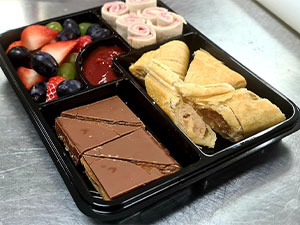One of the many benefits of moving to a care home is the expertise and experience of staff in monitoring and managing residents’ nutrition and weight. The care sector has traditionally been most concerned with weight loss in older people rather than obesity. According to Public Health England, in 2019 1.3 million people aged over 65 were malnourished or at risk of malnutrition. One-third of people in this age group are found to be at risk when they are admitted to hospital, and the same proportion is discovered to be at risk on admittance to a care home.
However, at the other end of the spectrum, the situation is changing as care homes are seeing more residents entering their homes who are overweight. The proportion of adults who are obese increases with age and is highest among men aged between 45 and 64 (36%), and among women aged between 45 and 54 (37%).*
The Malnutrition Universal Screening Tool (MUST) is a five-step tracking tool to identify adults who are malnourished, at risk of malnutrition, or obese. A resident with a high MUST score can be overweight or underweight. Use of the tool is driven by the catering teams at Country Court. They are keen to take a proactive approach to manage residents' weight and nutrition. Through improving their understanding of which residents are losing or gaining weight and work with Senior Carers and Home Managers to put corrective actions in place.

“Our first step is to meet with residents and find out why they might be losing weight.” Explained Steven Ireland, Catering Operations Support Manager. “There has always been communication with chefs, residents and care staff about people’s weight. However, with the introduction of our monthly monitoring tools, we have a better overview and can proactively adjust people’s daily food and drink intake. Thereby ensuring they are well-nourished and a retain a healthy weight.”
“By taking a more holistic approach to nutrition we’ve learned so much.” he continued. “We’ve seen how people’s appetites, food preferences and eating habits change over time. This is especially true for residents who are living with dementia. We can now monitor and respond to these changes much more closely.”
“By recording people's weight in the Nourish electronic care planning system, we can quickly and easily see which residents have experienced changes in their weight.” Said Natalie White, Home Manager at Rose Lodge Care Home in Market Deeping. “I use the reporting system to track changes in people's weight and flag up any unexpected changes. The care team and catering team have worked closely together to put preventative measures in place to assure good nutritional care of residents”.
The Catering Team have launched several new initiatives due to being involved in monitoring residents’ weight. Grazing boxes have been a particular success. Grazing boxes are designed for residents who are living with dementia and ‘walk with purpose’. This means that they will pace or walk around throughout the day and often night-time too. Due to constantly exercising and rarely able to sit for long enough to eat a whole meal, these residents are prone to experiencing weight loss and more at risk of falls.

Grazing boxes contain a range of healthy food to be eaten on the move. Care staff can offer residents the grazing box throughout the day or leave it in their room where they can access it at any time. There is one for the morning and a different one for the afternoon, so that the food is always fresh. The boxes contain a total of 2000 calories and a balanced range of food to ensure that people have had enough calories throughout the day.
The ‘Malnutrition Universal Screening Tool’ (‘MUST’) was developed by the Malnutrition Advisory Group, a standing committee of BAPEN and it has been reviewed regularly since its launch in 2003. It is supported by many governmental and non-governmental organisations, including the British Dietetic Association (BDA), the Royal College of Nursing (RCN) and the Registered Nursing Home Association RNHA) and is the most commonly used screening tool in the UK. It is also used in many other countries in Europe and the rest of the world.

For more information about how Country Court monitor resident’s health and wellbeing speak to the Home Manager at your nearest care home. To find out more about working in the catering team at a Country Court Care Home click here.